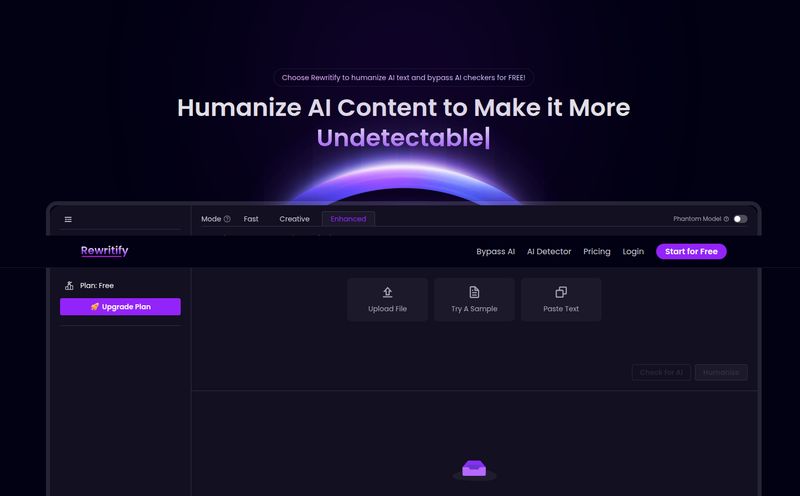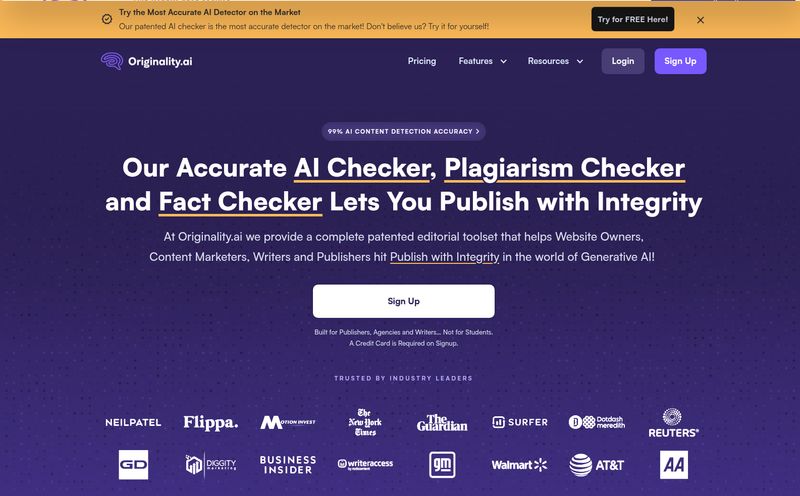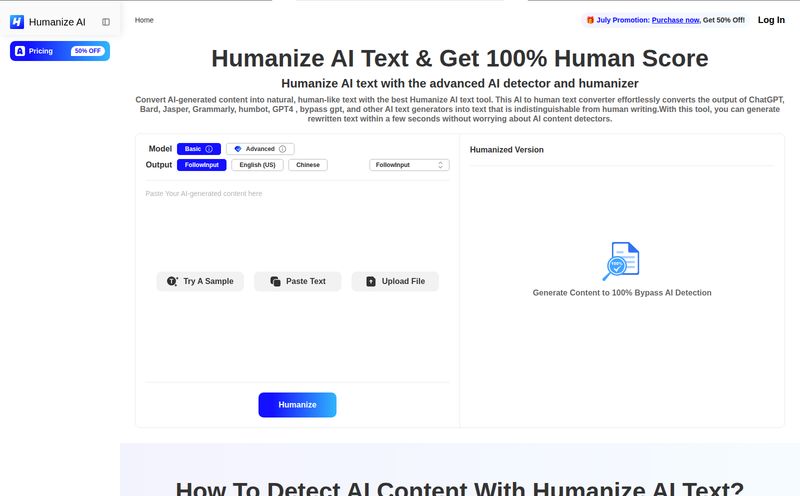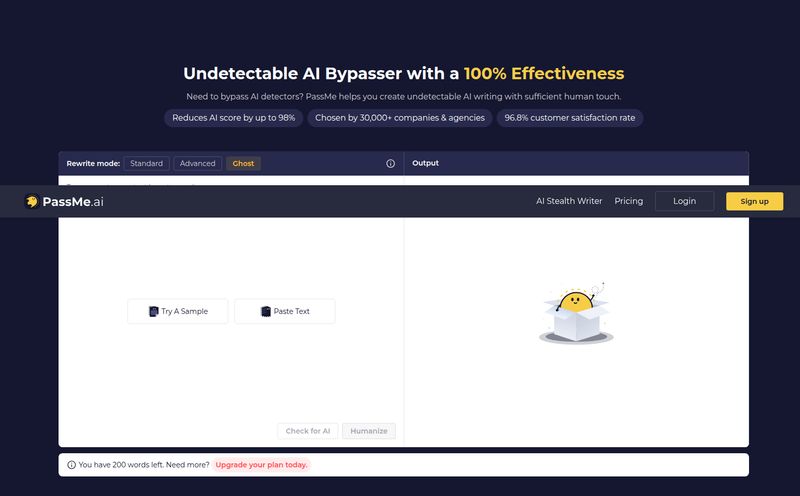If you’ve been in the SEO and content game for more than five minutes, you’ve seen the tsunami of AI-generated articles. It’s everywhere. Some of it’s okay, most of it is… well, it has the soul of a microwave instruction manual. We're all drowning in a sea of perfectly structured, utterly boring content. And we're all a little bit worried, aren't we? Worried about our content sounding generic, worried about Google updates, worried about losing that special something that makes our brand voice ours.
I’ve been testing tools left and right, looking for something that doesn’t just spin words but actually understands style. So when I stumbled upon Mochi Human Text, with its bold claim to “Clone Your Writing Style,” my cynical SEO heart skipped a beat. A tool that learns how I write and then applies that to AI drafts? Color me intrigued. So I took it for a spin. Here’s what I found.
First Off, What Exactly is Mochi Human Text?
Let's cut through the jargon. Mochi Human Text is an AI-to-human text converter. You feed it robotic, AI-generated content, and it rewrites it to sound like a person wrote it. More specifically, it can learn to sound like you. The whole point is to move beyond generic AI output and create content that has your unique fingerprint all over it, helping you scale your personality without spending every waking hour typing.
This isn't just about making sentences sound prettier. It’s a direct response to a growing problem. As AI tools get more common, our content risks becoming a bland echo chamber. Mochi is positioned as the antidote to that, a way to “future-proof” your content. A bold claim, for sure.

Visit Mochi Human Text
The Big Question: Why Bother Humanizing AI Content?
Some folks might argue, “If the AI content is factually correct and grammatically sound, who cares?” I care. Your readers care. And I’m willing to bet Google cares. We’ve all seen the Helpful Content Updates. Google’s getting smarter, looking for content made for people, not just for search engine crawlers. Content that demonstrates experience and expertise.
That’s where the “Why?” on Mochi’s homepage really hits home. They state that AI content is not future-proof. And I think they're right. Relying solely on raw AI output is a risky long-term strategy. Your brand voice is your most valuable asset online. It’s how people recognize you, trust you, and decide to buy from you. Automating your content creation shouldn't mean automating your personality away. Mochi's promise is to let you have your cake and eat it too: the speed of AI with the authenticity of you.
How Mochi Clones Your Unique Voice
This is the part that felt a little like magic. The process is deceptively simple. To create a custom AI model of your writing style, you just give it your website’s URL. That’s it. The platform then crawls your site, analyzes your existing content, and builds a profile of your voice. It’s like a digital apprentice that studies your entire body of work to learn your cadence, your favorite phrases, your humor, and your unique way of explaining things.
Once your voice is cloned, you can feed it any old AI draft, and it will rewrite it in your style. I find this fascinating. It's not just about passing an AI detector; it's about maintaining brand consistency on a massive scale. Imagine having a team of writers or using various AI tools but ensuring the final output always sounds like it came straight from you. That’s powerful stuff.
Putting It To The Test: My Favorite Features
I spent some time playing around, and a few things really stood out.
Style Cloning At Scale
For me, this is the main event. I’ve worked with agencies and large content teams, and maintaining a consistent brand voice across a dozen writers is a constant battle. Some writers are too formal, others too casual. Mochi offers a legitimate solution here. You train it once on your core content, and it becomes the style guide. It's a way to enforce your brand voice programmatically. For solo creators, it means you can use AI to hammer out a first draft and then quickly polish it into something that's publish-ready and on-brand, saving countless hours.
Running the AI Detector Gauntlet
Let's be honest, a huge draw for a tool like this is bypassing AI content detectors. While I firmly believe you should always be adding genuine value and editing AI content, we operate in a world where being flagged as AI can have negative consequences, whether real or perceived. I ran some Mochi-fied text through a few popular detectors, and it passed with flying colors. It doesn't just swap synonyms; it restructures sentences and changes the flow in a way that feels much more organic.
The API is a Potential Game-Changer
Most casual users might skip over this, but the availability of an API is huge. This means you can integrate Mochi’s humanization engine directly into your own workflows and applications. Think about it: you could build a system that automatically pulls a draft from GPT, sends it to Mochi to be rewritten in your brand voice, and then loads it into your WordPress drafts. For agencies and developers, this opens up a whole world of automation possibilities.
Let's Talk Money: A Refreshingly Simple Pricing Model
I am so tired of complicated, multi-tiered subscription plans. Seriously. Mochi’s pricing is a breath of fresh air. It’s a pay-as-you-go model. You start with an $8 plan that gives you unlimited words using their default human voice. No credit card is needed to get a feel for it, which is a nice touch.
The real power, though, is in the custom training. And the cost is surprisingly reasonable:
- Training: $0.0003 per word.
- Text Output (with your custom voice): $0.0008 per word.
Let's put that into perspective. Say you have a blog with 100,000 words of content you want to train it on. The training cost would be a one-time fee of just $30 (100,000 $0.0003). That’s less than a fancy dinner. After that, humanizing a 1,500-word article would cost you $1.20. For the value it provides, that's incredibly competitive.
The Not-So-Perfect Parts: A Few Caveats
No tool is perfect, and Mochi is no exception. There are a few things to keep in mind.
First, the custom AI training currently requires a website. If your best writing is locked away in Google Docs or a newsletter, you might have to publish it first. I imagine they'll add other training methods down the line, but for now, it's a limitation.
Second, and this is true for any AI, the output quality depends on the input quality. The classic “Garbage In, Garbage Out” principle applies. If you train Mochi on poorly written, inconsistent content, your custom AI model won’t be very good. You need a solid base of quality content for it to learn from.
Finally, while the custom training is cheap, it's still an extra cost. But in my opinion, if you're serious about your brand voice, it's an investment, not an expense.
Who Is This Tool Actually For?
So, who should be rushing to try Mochi Human Text? I see a few key groups:
- Solo Bloggers and Content Creators: Anyone looking to increase their output with AI without sacrificing their personal brand and unique voice.
- Marketing Agencies: Teams that need to produce content for multiple clients, each with a distinct brand voice. This could be a secret weapon.
- In-House Content Teams: Larger companies that need to ensure brand consistency across all their communications, from blog posts to website copy.
Frequently Asked Questions
Can I use this without creating a custom AI voice?
Absolutely. You can use their default human voice right out of the box. It does a solid job of making AI text sound more natural, though it won't have your specific personality.
Will my writing style be used to train other people's AI?
According to their site, your cloned writing style is reserved for your own private use. This is a critical point for privacy and protecting your unique brand asset.
Is the training a one-time thing?
Yes, you train the model once on your existing content. If you significantly evolve your writing style over time, you might want to retrain it on newer content, but for the most part, it's a one-and-done setup.
What if I don't have a website to train the AI on?
Currently, a website link is the primary method for training. Their FAQ suggests this is the case for now, so you might need to get your content onto a blog or site to take advantage of the cloning feature.
Okay, what's with the 'WTF is libcurl?' in their FAQ?
Haha, I saw that too. It's a nerdy little inside joke. `libcurl` is a common software library used for transferring data with URLs. Including it shows a bit of personality and a sense of humor, which I honestly appreciate. It tells me there are real, slightly geeky humans behind the curtain.
Final Thoughts: Is Mochi Human Text a Must-Have Tool?
After digging in, I'm genuinely impressed. Mochi Human Text isn’t a magic wand that will turn bad ideas into brilliant prose. But it is an incredibly clever and well-executed tool that solves a very real problem for modern content creators. It's a voice chameleon, a brand guardian, and a productivity booster all rolled into one.
The ability to clone your own writing style is, for me, the standout feature that elevates it above a simple “AI paraphraser.” It’s a sophisticated approach to a nuanced problem. If you're leveraging AI to help with your content but are worried about sounding like a robot, you should absolutly give Mochi a try. It might just be the tool that helps you stay human in an increasingly automated world.



